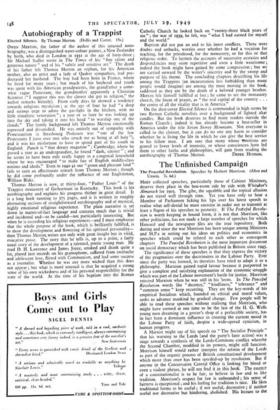Autobiography of a Trappist OWEN MERTON, the father of the
author of this unusual auto- biography, was a distinguished water-colour painter, a New Zealander
by birth, who died in London in 193t at the age of forty-three ;
Sir Michael Sadler wrote in The Times of his "fine talent and generous nature" and of his "subtle and sensitive art." The death
of his father left Thomas Merton an orphan, for his American mother, also an artist and a lady of Quaker sympathies, had pre- deceased her husband. The boy had been born in France, where he lived for many years ; but much of his boyhood and youth was spent with his American grandparents, the grandfather a some- what vague Protestant, the grandmother apparently a Christian Scientist (" I suppose this was the closest she got to religion," the author remarks bitterly). From early days he showed a tendency towards religious mysticism ; at the age of four he had "a deep
and serious urge to adore the gas-light in the kitchen, with no little ritualistic veneration" ; a year or so later he was looking up into the sky and taking it into his head "to worship one of the clouds." The family background left Thomas Merton emotionally repressed and dissatisfied. He was entirely out of sympathy with Protestantism (a Strasbourg Professor was "one of the few Protestants I have ever met who struck me as being at all holy "), and it was his misfortune to have to spend part of his youth in England. Punch is "that dreary magazine " ; Cambridge, where he passed a year as an undergraudatc, he found "dark, sinister " ; and he seems to have been only really happy in a congenial household where he was encouraged "to make fun of English middle-class notions and ideals." Even in 1940-41 our "green and pleasant land" fails to earn an affectionate remark from Thomas Merton ; though he did come profoundly under the influence of one Englishman, William Blake.
Thomas Merton is now, at thirty-four, "Father Louis" of the Trappist monastery of Gethsemani in Kentucky. This book is his autobiography and explains his progress thither in great detail. It is a long book running to 375 pages, and it is written in roughly alternating sections of straightforward autobiography and of mystical, highly emotional religious experience. The plain narrative is set down in matter-of-fact language and contains much that is trivial and incidental and—to be candid—not particularly interesting. But when he is recording his religious experiences—and I must emphasise that the whole purpose of the book, which is brilliantly fulfilled, is to show the development and flowering of his spiritual personality— then Thomas Mertorovrites not only with great insight but in vivid, evocative prose. The story that he tells is, up to a point, a fairly usual story of the development of a talented, poetic young man. He read D. H. Lawrence and James Joyce, smoked and drank quite a lot, played jazz records on his gramophone, suffered from toothache and adolescent love, flirted with Communism, and had some success as a journalist. Whether he was any more wicked than this does not appear ; but what is moth unusual is that he acquired a strong sense of his own wickedness and of his personal responsibility for the state of the world. At the time of his baptism into the Roman Catholic Church he looked back on "twenty-three black years of sin " ; the war of 1939, he felt, was "what I had earned for myself and the world."
Baptism did not put an end to his inner conflicts. There were doubts and setbacks, worries over whether he had a vocation for teaching, for the priesthood, for the monastery, or for this or that religious order. To laymen the accounts of successive ecstasies and despondcncies may seem repetitive and even a little wearisome ; indeed the book might have gained by some compression ; but we are carried onward by the writer's sincerity and by the sweep and purpose of his theme. The concluding chapters describing his life among the Trappists (an incarceration less forbidding than many people would imagine) are among the most moving in the book, saddened as they arc by the death of a beloved younger brother. Merton felt himself fulfilled at last ; he came to see the monastery
church, the fount of prayer, as "the real capital of the country . the centre of all the vitality that is in America."
On the dust-cover Elected Silence is commended in high terms by two Roman Catholic novelists over a .background of lighted altar
candles. But the book deserves to find many readers outside the Roman Church ; indeed it has already become a best-seller in
America under the title Seven Storey Mountain. Not everyone is
called to the cloister, but it can do no one any harm to consider whether he is living the life in which he can give the best service
to his fellow men. I am sure that many whose !motions are geared to lower levels of intensity, or whose consciences have led them to other faiths and philosophies, will gain from reading the autobiography of Thomas Merton. DEREK HUDSON.


































 Previous page
Previous page